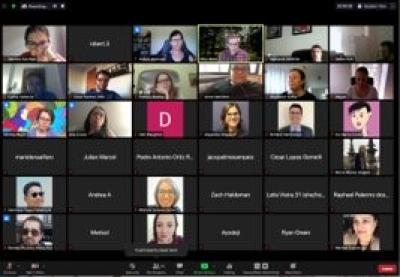The Department of Spanish and Portuguese Language Program faced a number of challenges with the transition from in-person to online courses amid the COVID-19 pandemic. Megan Lobert, Assistant Language Program Director, was kind enough to take some time to discuss how the program has overcome these challenges in the Autumn 2020 semester.

“Through a year-long mentorship with the Office of Distance Education and eLearning (ODEE), the Language Program director, Dr. Holly Nibert, and I began building the first fully online Spanish class in the department back in 2015. Since that time, we’ve had a lot of wonderful voices contribute to our online courses and shape them into what they are today.” This previous experience in building on-line courses in SPPO’s Language Program was extremely helpful once the COVID-19 pandemic hit. In terms of technology, many of the elements of the language courses had already been setup within Carmen (the university’s on-line teaching platform). Lobert noted that “instructors design an enormous variety of materials for their online classes, but the actual course structure within Carmen is provided for them by the Language Program. This really helped us when we had to quickly move our face-to-face courses to a completely online format due to the pandemic and continued to serve us well throughout the Autumn 2020 semester.”
The online transition was a joint effort between the SPPO Language Program leadership team and the instructors. “We are fortunate to have a lot of amazing instructors who were able to adapt very quickly. Although we already had the online structure built for the courses, it shouldn’t diminish the countless challenges instructors faced during that time. We appreciate how hard they worked to learn about these elements and implement them in their courses.” The Language Program’s leadership team (Director Dr. Holly Nibert, Assistant Directors Megan Lobert and Dr. Richard Henricksen, and Portuguese Coordinator Dr. Michele Saraiva Carilo) worked to foster an environment of patience and open-mindedness, where instructors could receive plenty of assistance throughout the year. Lobert points out, “One of the challenges that’s often overlooked is that face-to-face courses cannot just be transplanted into a website or learning management system, such as CarmenCanvas. Often times people can be surprised by the significant learning curve when transitioning a face-to-face course to online. It takes training and substantial practice to successfully adapt. With that said, our instructors were absolutely phenomenal and did better than we could have asked!”
Another challenge the Language Program faced was an element unique to language courses - implementing ways for students to practice speaking in the target language with their instructor and peers. To overcome this obstacle, the Language Program implemented weekly virtual classes as well as virtual small-group chats in each course to practice their speaking and comprehension of the language. “Students and instructors have seemed to enjoy this aspect of the language courses. This feedback has been especially rewarding given the constant challenge to balance best practices in Second Language (L2) pedagogy with instructor workload.”
Despite the hardships that the Language Program faced in its transition to all online courses, Lobert says that she has also seen many silver linings. “It’s pushed us forward as a program in terms of technology. Assignments and components from the program’s face-to-face sections that were still not electronic have been forced to move online. As a result, the transition to online has not only exponentially improved digital literacy skills and administrative efficiency, but it has also resulted in notable positive externalities such as becoming more eco-friendly due to the sizeable reduction in printing. It’s amazing to look back and see how much progress we’ve been able to make in such a short period of time.” When asked if she expects even more courses to be online moving forward, she said, “That depends on multiple factors. Even pre-Covid, the student demand for online Spanish courses in our department was relatively high. How the pandemic will impact student and instructor interest in continuing in the online modality is pure speculation at this point. One thing is certain: the program is rapidly evolving and growing during this time. The future of L2 teaching in our program, post-Covid, will be about adapting to a “new normal” and embracing the changes that occurred as a result of the pandemic.” With that said, Lobert recognizes that online is not a replacement to face-to-face instruction (and vice versa), at least not in the Language Program. The department will aim to offer a reasonable balance between online and face-to-face sections to accommodate need. “For now, we’re just really pleased that instructors and students seem to be, overall, adapting well in online thus far. Even though our online language courses have come a long way since the first offering in 2015, we are constantly searching for new ways to improve.”
The Department of Spanish and Portuguese is very fortunate to have such a strong Language Program. As the second largest program in the Big Ten, we could not have made it through these trying times without the tireless work of the leadership team and the determination of our instructors.
